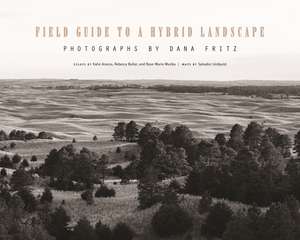Field Guide to a Hybrid Landscape
Autor Dana Fritz Introducere de Katie Ananiaen Limba Engleză Paperback – 2023
In Field Guide to a Hybrid Landscape Dana Fritz traces the evolution of the Bessey Ranger District and Nursery of the Nebraska National Forest and Grasslands. Fritz’s contemporary photographs of this unique ecosystem, with provocative environmental essays, maps, and historical photographs from the U.S. Forest Service archives, illuminate the complex environmental and natural history of the site, especially as it relates to built environments, land use, and climate change.
The Nebraska National Forest at Halsey, as it is known colloquially, is the largest hand-planted forest in the Western Hemisphere, and formerly in the world. This hybrid landscape of a conifer forest overlaid onto a semiarid grassland just west of the one-hundredth meridian was an ambitious late nineteenth-century idea to create a timber industry, to reclaim a landscape considered disordered and unproductive, and to change the local climate in northcentral Nebraska. While the planners seemed not to appreciate the native grasslands that form the ecosystem of the Nebraska Sandhills, they did recognize the reliable water from the Dismal and Middle Loup Rivers that border the site. In 1902 the first federal nursery was established as part of the Dismal River Forest Reserve to produce seedlings for plains homesteads and the adjacent treeless tract of land. At that time tree planting was not used for carbon sequestration but to mitigate the wind and evaporation of moisture.
The Bessey Nursery now produces replacement seedlings for burned and beetle-damaged forests in the Rocky Mountains and for the Nebraska Conservation Trees Program. This constructed landscape of row-crop trees that were protected from fire for decades, yet never commercially harvested for timber, provides a rich metaphor for current environmental predicaments. The late nineteenth-century effort to reclaim with trees what was called the Great American Desert has evolved to a focus on twenty-first-century conservation, grassland restoration, and reforestation, all of which work to sequester carbon, maintain natural ecosystem balance, and mitigate large-scale climate change. Field Guide to a Hybrid Landscape offers a visual and critical examination of this unique managed landscape, which has implications far beyond its borders.
Preț: 142.09 lei
Nou
Puncte Express: 213
Preț estimativ în valută:
27.19€ • 28.28$ • 22.45£
27.19€ • 28.28$ • 22.45£
Carte disponibilă
Livrare economică 24 martie-07 aprilie
Preluare comenzi: 021 569.72.76
Specificații
ISBN-13: 9781496227775
ISBN-10: 1496227778
Pagini: 144
Ilustrații: 78 photographs, 2 illustrations, 9 maps
Dimensiuni: 254 x 203 x 15 mm
Greutate: 0.52 kg
Editura: BISON BOOKS
Colecția Bison Books
Locul publicării:United States
ISBN-10: 1496227778
Pagini: 144
Ilustrații: 78 photographs, 2 illustrations, 9 maps
Dimensiuni: 254 x 203 x 15 mm
Greutate: 0.52 kg
Editura: BISON BOOKS
Colecția Bison Books
Locul publicării:United States
Notă biografică
Dana Fritz is Hixson-Lied Professor of Art and Center for Great Plains Studies Fellow at the University of Nebraska–Lincoln. She is the author of Terraria Gigantica: The World under Glass.
Cuprins
Preface
Tillage, Indigeneity, Supplementarity or: Every Treeless Horizon Wants to Thrive in Peace 000
Katie Anania
sand / wind / water
planting
thinning
fire
decomposition
sowing
Planting, Fire, Time, and Commingling Species in the Sandhills
Rose-Marie Muzika
Reenvisioning a Visioned Landscape
Rebecca Buller
Epilogue
Gallery
Acknowledgments
Further Reading
Contributors
Tillage, Indigeneity, Supplementarity or: Every Treeless Horizon Wants to Thrive in Peace 000
Katie Anania
sand / wind / water
planting
thinning
fire
decomposition
sowing
Planting, Fire, Time, and Commingling Species in the Sandhills
Rose-Marie Muzika
Reenvisioning a Visioned Landscape
Rebecca Buller
Epilogue
Gallery
Acknowledgments
Further Reading
Contributors
Recenzii
"Field Guide to a Hybrid Landscape truly is a work of art. If you have any interest in the Great Plains region, you will want to spend some time exploring this book."—Nathan Eidem, Nebraska History Magazine
“As we consider ways to mitigate climate change and to remember our connection and responsibility to nature, this book is important. Afforestation’s history in the Nebraska Sandhills is an informative, fascinating, and useful story. What I like best about this book is the combination of art, science, history, and geography, which belong together anyway, but seldom are as smoothly integrated as in Dana Fritz’s work here.”—Terry Evans, photographer and author of Prairie Stories and Heartland: The Photographs of Terry Evans
Descriere
Dana Fritz’s photographs of Nebraska’s hand-planted forest make visible the forces such as sand, wind, water, planting, thinning, sowing, and burning that have shaped this unique landscape.
